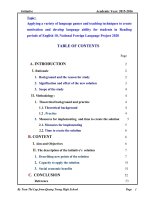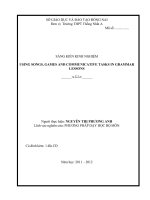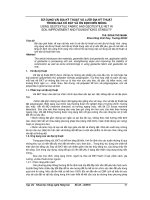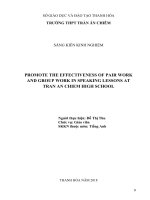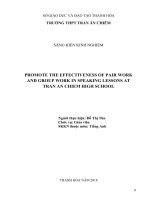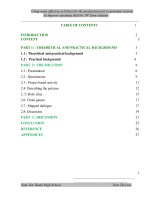skkn USING SONGS, GAMES AND COMMUNICATIVE TASKS IN GRAMMAR LESSONS
Bạn đang xem bản rút gọn của tài liệu. Xem và tải ngay bản đầy đủ của tài liệu tại đây (559.96 KB, 25 trang )
SỞ GIÁO DỤC VÀ ĐÀO TẠO ĐỒNG NAI
Đơn vị: Trường THPT Thống Nhất A
Mã số: ................
SÁNG KIẾN KINH NGHIỆM
USING SONGS, GAMES AND COMMUNICATIVE TASKS IN GRAMMAR
LESSONS
____________
Người thực hiện: NGUYỄN THỊ PHƯƠNG ANH
Lĩnh vực nghiên cứu: PHƯƠNG PHÁP DẠY HỌC BỘ MÔN
Có đính kèm: 1 đĩa CD
Năm học: 2011 – 2012
SƠ LƯỢC LÝ LỊCH KHOA HỌC
___________________
I.
THÔNG TIN CHUNG VỀ CÁ NHÂN
1.
Họ và tên: NGUYỄN THỊ PHƯƠNG ANH
2.
Ngày tháng năm sinh: 20/ 02 / 1976
3.
Nam, nữ: Nữ
4.
Địa chỉ: 1442 - Quảng Biên - Quảng Tiến - Trảng Bom - Đồng Nai
5.
Điện thoại: 061 3866239 (CQ) – 061 3676295 (NR)
ĐTDĐ: 01202569897
6. Chức vụ: Giáo viên
7. Đơn vị công tác: Trường THPT Thống Nhất A
II. TRÌNH ĐỘ ĐÀO TẠO
1. Trình độ chuyên môn: cử nhân ngoại ngữ
2. Năm nhận bằng: 2000
3. Chuyên ngành đào tạo: Anh văn
III. KINH NGHIỆM KHOA HỌC
1. Lĩnh vực chuyên môn có kinh nghiệm: Giảng dạy
2. Số năm có kinh nghiệm: 12 năm
2
BM03-TMSKKN
Tên sáng kiến kinh nghiệm:
USING SONGS, GAMES AND COMMUNICATIVE TASKS IN GRAMMAR
LESSONS
I. THE REASONS FOR THE TOPIC BEING CHOSEN
English is a structure based language which has sets of grammar rules. To be
successful in examinations as well as communication, learners should master those
structures and grammar rules.
Students are supposed to acquire structures and grammar rules in language focus
lessons with a considerate amount of time. However, students often find language
focus lessons boring, dry and stressful. They also find it daunting to remember so
many rules. Why don’t we try teaching structures and grammar rules in more
interesting ways and in context. Only by doing so can students find it easier to
remember English grammar rules and be able to use the grammatical points they have
learnt to do the tests as well as to express their thoughts, opinions and feelings
effectively.
II. REAL SITUATION BEFORE THESE SOLUTIONS ARE CARRIED OUT
1. Advantageous conditions
The portion of grammar points in a test is about half. Mastering grammar means
getting higher scores in the tests. This encourages students to learn grammar.
Senior high school students are asked to do most of the revision in grammar
lessons. They already studied these grammatical points in junior high school.
2. Difficulties
High school students are not as motivated as learners in language centres. Learners
in those centres study English partly because they love it and because they have a clear
target to study it. Therefore, they try their best in learning. Meanwhile, high school
students learn English simply because it is a subject at school.
Most of my students do not like English. 9 out of 10 classes in my school major in
natural science subjects. They don’t like social science subjects. English is not their
favourite.
Teenagers like something funny. However, some teachers think that students must
be serious in studying grammar. Therefore, they like to conduct structure based, formal
rather than structure-discourse match activities in grammar teaching.
English language has so many grammar rules to remember. And the speaker must
stick on these grammar rules to produce good English. This is so challenging.
3
3. Statistics
Grade Number of
students
10
45
12
120
Total
165
Mark 5 and over
total
rate
16
35.5%
50
41.6%
66
40%%
Under mark 5
total
rate
29
64.5%
70
58.4%
99
60 %
III. CONTENT
1. Underlying Principles
Most of us, human beings, prefer playing to working. When we play a game, we
feel happy and we engage in the activity totally. We enjoy it and we keep the memory
of it for a long time. The same goes for the studying of students. When they find
something interesting, their learning becomes more enjoyable and their motivation
increases. If they “enjoy” their lesson, they will learn it the easy way and they will
remember what they have learnt for ages.
2. Solutions
Let’s have a look at the national curriculum. High school students are required to do
the revision in most of the language focus lessons, which is a favorable condition to
exploit songs, games and communicative tasks.
In order to make a grammar lesson effective, beneficial, and interesting a teacher
should use some well-developed and fascinating techniques in the classroom. We can
employ the use of songs, games, and communicative tasks to make grammar lessons
interesting, memorable, motivating and meaningful.
There are many advantages of using songs in the classroom. Through using popular
songs, which are already familiar to teenagers, the teacher can meet the challenges of
the teenage needs in the classroom. Since the meaning is an important device in
teaching grammar, it is important to contextualize any grammar points. Songs are one
of the most enchanting and culturally rich resources that can easily be used in language
classrooms. Songs offer a change from routine classroom activities. As stated by Lo
and Fai Li (1998:8), learning English through songs also provides a non-threatening
atmosphere for students, who usually are tense when learning English in a formal
classroom setting. Since they provide authentic texts, they are motivating.
In consequence, if selected properly and adopted carefully, a teacher should benefit
from songs in all phases of teaching grammar. Songs may be used for the presentation
or the practice phase of the grammar lesson, to review or introduce grammar points.
Songs can be used with several techniques. Some examples of these techniques are:
•
Gap fills or cloze texts
•
Focus questions
•
True-false statements
•
Put these lines into the correct sequence
•
Dictation
4
Add a final verse
•
Circle the antonyms/synonyms of the given words
•
Discuss
Working with grammar can be frustrating for students and teachers. Concepts of
grammar, such as tenses, sentence structure, types of sentences and word composition
can be difficult for students to understand. Playing grammar games in the classroom
provides valuable practice while keeping the atmosphere fun and engaging. While
playing games, the learners’ attention is on the message, not on the language. In a way,
students acquire language unconsciously since their whole attention is engaged by the
activity. The use of games is a more effective way to teach grammar than structured
formal lessons. According to Arif Saricoban and Esen Metin, they help students learn
how to apply the knowledge they've learned. Grammar games increase motivation and
excitement, cooperation and competition in the classroom.
The latest concern of the foreign language teachers is to make the students use the
language communicatively. Games and problem-solving activities, which are taskbased and have a purpose beyond the production of correct speech, are the examples of
the most preferable communicative activities. Such activities highlight not only the
competence but also the performance of the learner. They are the indispensable parts
of a grammar lesson, since they reinforce a form-discourse match. In such activities the
attention is on the discourse context.
In short, the use of songs, games and communicative tasks in language classrooms
provides many advantages. They entertain and relax the learners while they are
learning or practicing a structure, and they often eliminate the students’ negative
attitude towards learning. Through providing authenticity and context they make the
grammar points more understandable and easy. As language teachers, we can benefit
from using songs, games and communicative tasks since our concern is to motivate the
students and draw their utmost attention on the subject during teaching.
Syllabus overview
•
Unit
1
2
3
ENGLISH 10
- The present simple
- Adverbs of frequency
- The past simple
- Wh- questions
- Gerund and to
infinitive
- The past perfect
- The past perfect vs. the
past simple
ENGLISH 11
- Infinitive with to
- Infinitive without to
ENGLISH 12
Tense revision
- Present simple
indicating past time
- Tense revision: past
simple, past
progressive and past
perfect
- Infinitive and gerund
- Passive infinitive and
gerund
Tense revision
Reported speech
5
4
- The + adjective
- Used to + infinitive
- Which as a connector
5
- The present perfect
- The present perfect
passive
- Who, which, that
- The present progressive
with a future meaning
- Be going to
- The present perfect
- Because of and in spite
of
6
7
8
9
- Reported speech:
statements
- Conditional sentence
type 1
- Should
- Conditional sentence
type 2
10
- The passive voice
11
- Conditional sentence
type 3
12
- To infinitive to talk
about purposes
- Wh-questions
13
- Attitudinal adjectives
- It is/was not until….
that
- A/an and the
- Will vs. be going to
- Will: making
predictions
- Will: making offers
14
- Gerund and present
participle
- Perfect gerund and
perfect participle
(omitted)
Passive voice
- Reported speech with
gerund
Relative clauses
- Conditional types 1
and 2
- Conditional type 3
- Conditional in
reported speech
- Pronouns one(s),
someone, anyone, no
one, everyone
(omitted)
- Defining relative
clauses (revision)
- Non-defining relative
clauses (revision)
Relative pronouns with
prepositions
Relative clauses
replaced by participles
and to infinitives
(revision)
- Relative clauses
(revision)
- Omission of relative
pronouns
- Cleft sentences
(omitted)
(omitted)
Conditional sentences
Prepositions and articles
Modal verbs: may, might,
must, mustn’t, needn’t
Modals in the passive
voice
Transitive and intransitive
verbs
- Comparative + and +
comparative
- The + comparative, the +
comparative
Phrasal verbs
6
15
(omitted)
16
- Comparatives and
superlatives
- Could/ be able to
- Tag questions
- It is said that…
- People say that…
Phrasal verbs
Adverbial clause of time
3. Illustrations
3.1. Tenses
a. Exploiting songs
- Past tense:
Teacher can jumble the verses and ask student to rearrange them after listening to the
song. After that teacher can ask students to underline all the verbs in simple past tense
and state the uses of the simple past. This exercise can be done in presentation stage.
"Yesterday" by The Beatles
Yesterday, all my troubles seemed so far away
Now it looks as though they're here to stay
Why she had to go I don't know she wouldn't say
Oh, I believe in yesterday
Suddenly, I'm not half the man I used to be
Oh, I believe in yesterday
There's a shadow hanging over me.
I said something wrong, now I long for yesterday
Yesterday, love was such an easy game to play
Now I need a place to hide away
Oh, I yesterday came suddenly
Why she had to go I don't know she wouldn't say
Yesterday, love was such an easy game to play
I said something wrong, now I long for yesterday
Now I need a place to hide away
Oh, I believe in yesterday
Mm mm mm mm mm mm mm
The correct answer:
Yesterday, all my troubles seemed so far away
Now it looks as though they're here to stay
Oh, I believe in yesterday
Suddenly, I'm not half the man I used to be
There's a shadow hanging over me.
Oh, I yesterday came suddenly
Why she had to go I don't know she wouldn't say
I said something wrong, now I long for yesterday
Yesterday, love was such an easy game to play
Now I need a place to hide away
Oh, I believe in yesterday
7
Why she had to go I don't know she wouldn't say
I said something wrong, now I long for yesterday
Yesterday, love was such an easy game to play
Now I need a place to hide away
Oh, I believe in yesterday
Mm mm mm mm mm mm mm
Another song that can be used for past simple is “Hotel California” by Eagles. Teacher
can leave out some verbs and asks students to fill in the gaps. This exercise should be
done in practice stage.
On a dark desert highway, cool wind in my hair
Warm smell of colitas, rising up through the air
Up ahead in the distance, I (1)____ a shimmering light
My head grew heavy and my sight grew dim
I had to stop for the night
There she (2)____ in the doorway;
I heard the mission bell
And I was thinking to myself,
’this could be heaven or this could be hell’
Then she (3)____ up a candle and she showed me the way
There were voices down the corridor,
I thought I (4)___ them say...
Welcome to the hotel California
Such a lovely place
Such a lovely face
Plenty of room at the hotel California
Any time of year, you can find it here
Her mind is tiffany-twisted, she (5)___ the Mercedes bends
She got a lot of pretty, pretty boys, that she calls friends
How they dance in the courtyard, sweet summer sweat.
Some dance to remember, some dance to forget
So I (6)___ up the captain,
’please bring me my wine’
He (7)___, ’we haven’t had that spirit here since nineteen sixty nine’
And still those voices are calling from far away,
Wake you up in the middle of the night
Just to hear them say...
Welcome to the hotel California
Such a lovely place
Such a lovely face
They livin’ it up at the hotel California
8
What a nice surprise, bring your alibis
Mirrors on the ceiling,
The pink champagne on ice
And she (8)___ ’we are all just prisoners here, of our own device’
And in the master’s chambers,
They (9)___ for the feast
The stab it with their steely knives,
But they just can’t kill the beast
Last thing I remember, I was
Running for the door
I had to find the passage back
To the place I (10)___ before
’relax,’ said the night man,
We are programmed to receive.
You can checkout any time you like,
But you can never leave!
Answers:
1. saw
6. called
2. stood
7. said
3. lit
8. said
4. heard
5. got
9. gathered 10. was
- Present continuous
Teacher can use the song “Lemon tree” by Fool’s Garden for Present continuous.
Teacher takes out some lines and ask students listen and put them in the correct places.
Eg:
a. I'm wasting my time
b. I'm sitting here
c. I'm driving around in my car
d. I'm steppin' around in the desert of joy
e. I'm waiting for you
I'm sitting here in the boring room
It's just another rainy Sunday afternoon
(1) _______________________________________
I got nothing to do
I'm hanging around
I'm waiting for you
But nothing ever happens and I wonder
(2) __________________________________
I'm driving too fast
I'm driving too far
I'd like to change my point of view
I feel so lonely
9
(3) ______________________________________
But nothing ever happens and I wonder
I wonder how
I wonder why
Yesterday you told me 'bout the blue blue sky
And all that I can see is just a yellow lemon-tree
I'm turning my head up and down
I'm turning turning turning turning turning around
And all that I can see is just another lemon-tree
(4) _______________________________
I miss the power
I'd like to go out taking a shower
But there's a heavy cloud inside my head
I feel so tired
Put myself into bed
While nothing ever happens and I wonder
Isolation is not good for me
Isolation I don't want to sit on the lemon-tree
(5) ___________________________________
Baby anyhow I'll get another toy
And everything will happen and you wonder
I wonder how
I wonder why
Yesterday you told me 'bout the blue blue sky
And all that I can see is just another lemon-tree
I'm turning my head up and down
I'm turning turning turning turning turning around
And all that I can see is just a yellow lemon-tree
And I wonder, wonder
I wonder how
I wonder why
Yesterday you told me 'bout the blue blue sky
And all that I can see, and all that I can see, and all that I can see
Is just a yellow lemon-tree
Answer:
1. I'm wasting my time
2. I'm driving around in my car
3. I'm waiting for you
4. I'm sitting here
5. I'm steppin' around in the desert of joy
- present perfect
10
b. Using games
- Present continuous
Teacher can do a pantomime for students to guess. Students work in groups to answer
the question “What am I doing?”`
E.g. Threading a needle and sewing on a button
Washing dishes, and perhaps breaking one.
Bowling.
Reading a newspaper while eating breakfast.
Combing your hair.
…
c. Communicative task
- Present perfect
Teacher can give out some cards with hints and ask students to ask and answer the
question “Have you ever ….?” Students are required to supply true answers in full with
the right form of the main verb.
E.g. Feed the lion
Break a window
Hide from the police
Teach English
Win a lottery
Steal anything
Hold a snake
…
- Simple present
Students work in pairs. One says something contrary to the fact, the other listens and
correct the false information.
E.g.: A: The sun rises in the west.
B: No. it’s not true. It rises in the east.
3.2. Conditionals
a. With songs
Teacher can ask students to listen and do the gap filling then elicit the verb tense used
in if clause and main clause, the usage of this type of conditional.
- Type 2:
Because I Love You by Shakin Stevens
If I …(1)… down on my knees and I pleaded with you
If I …(2)… a million oceans just to be with you
Would you ever let me down?
If I …(3)… the highest mountain just to hold you tight
If I …(4)… that I would love you every single night
Would you ever let me down?
Well I'm sorry if it sounds kinda sad, it's just that
Worried, so worried that you let me down
11
* Chorus: Because I love you, love you
Love you, so don't let me down
If I swam the longest river just to call your name
If I said the way I feel for you would never change
Would you ever …(5)… around
Well I'm sorry if it sounds kinda bad, just that
Worried, cuz' I'm so worried that you let me down
* Chorus
Teacher can also exploit the song “NOTHING'S GONNA CHANGE MY LOVE FOR
YOU” by Air Supply for conditional sentences by asking them to underline once the
conditional type 1 and underline twice the conditional type 2.
If I had to live my life without you near me
The days would all be empty
The nights would seem so long
With you I see forever oh so clearly
I might have been in love before
But it never felt this strong
Our dreams are young and we both know
They'll take us where we want to go
Hold me now
Touch me now
I don't want to live without you
Chorus :
Nothing's gonna change my love for you
You ought to know by now how much I love you
One thing you can be sure of
I'll never ask for more than your love
Nothing's gonna change my love for you
You ought to know by now how much I love you
The world might change my whole life through but
Nothing’s gonna change my love for you
If the road ahead is not so easy
Our love will lead the way for us
Like a guiding star
I'll be there for you if you should need me
You don't have to change a thing
I love you just the way you are
So come with me and share the view
I'll help you see forever too
Hold me now
12
Touch me now
I don't want to live without you
b. With games
Perfect couple game
Teacher divides the class into halves. One half writes “if clauses” into a pieces of
paper. The other writes “main clauses”. Teacher collects the two halves at random then
read out the complete sentence. Students listen and vote the perfect matching. This
game can spark laughter among students.
c. Communicative task
Teacher can give hints then ask students to discuss the questions “Under what
conditions would you ………….?
Exceed the speed limit while riding your motorbike.
Lie to your mother.
Steal food.
Carry a friend on your back for a long distance.
Quit class
- Type 2: Students sit in pairs, one speaks out the situation, the other gives advice,
beginning with if I were you …
A: I’m not good at English.
B: if I were you, I would spend more time learning it.
- Type 1: Teacher gives hints. Students work in pair and take it in turn to tell the peer
their plan for the future.
Study hard => go to university => have a good job => earn a lot of money => …
Eg:
If I study hard, I will go to university. If I go to university, I will have a good
job. …
3.3. Relative clause
a. Using songs
Teacher can ask students to listen and underline the relative clauses and the participles
replacing relative clauses in the verses.
“That’s why you go away” by Michael learns to rock
Baby won't you tell me why there is sadness in your eyes
I don't wanna say goodbye to you
Love is one big illusion I should try to forget
but there is something left in my head
You're the one who set it up now you're the one to make it stop
I'm the one who's feeling lost right now
Now you want me to forget every little thing you said
13
but there is something left in my head
[Chorus]
I won't forget the way you're kissing
The feeling's so strong were lasting for so long
But I'm not the man your heart is missing
That's why you go away I know
You were never satisfied no matter how I tried
Now you wanna say goodbye to me
Love is one big illusion I should try to forget
but there is something left in my head
[Chorus]
Sitting here all alone in the middle of nowhere
Don't know which way to go
There ain't so much to say now between us
There ain't so much for you
There ain't so much for me anymore
[Chorus]
3.4. Gerund and infinitive
a. Songs
Teacher can use this song at the presentation stage to explain when to use to
infinitive and gerund
“Say You Will” by Tokyo Square
Say you will, say you will be mine
I just keep missing you tonight
I feel so unsure, I feel so alone
I just don't dare to open my eyes
Into deep, going in too deep
I can't get you out of my mind
Baby no matter just how hard I try
I don't want to be alone tonight
Won't you be my guilding light
Lead the way to be by your side
Won't you be my star tonight
I need more than a neon light
Say you will…
14
Another song can be used for gerund, to infinitive and bare infinitive is “Proud Of
You” - Fiona Fung
Love in your eyes
Sitting silent by my side
Going on holding hands
Walking through the nights
Hold me up hold me tight
Lift me up to touch the sky
Teaching me to love with heart
Helping me open my mind
I can fly
I'm proud that I can fly
To give the best of mine
Till the end of the time
Believe me I can fly
I'm proud that I can fly
To give the best of mine
The heaven in the sky
Stars in the sky
Wishing once upon a time
Give me love make me smile
Till the end of life
Hold me up hold me tight
Lift me up to touch the sky
Teaching me to love with heart
Helping me open my mind
I can fly
I'm proud that I can fly
To give the best of mine
Till the end of the time
Believe me I can fly
15
I'm proud that I can fly
To give the best of me
The heaven in the sky
Can't you believe that you light up my way
No matter how that ease my path
I'll never lose my faith
See my fly
I'm proud to fly of high
Show you the best of mine
Till the end of the time
Believe me I can fly
I'm singing in the sky
Show you the best of mine
The heaven in the sky
Nothing can stop me
Spread my wings
So wide
3.5. Passive voice
Communicative task
Teacher can ask student to do peer work. Student A speaks out a sentence. Student B
listens and changes it into passive voice if possible. After 5 sentences, they will change
the role.
Eg:
Student A: Thomas Eve Edison invented the bulb.
Student B: The bulb was invented by Thomas Eve Edison.
Student A: Lisa is sitting at the table.
Student B: no passive
3.6. Comparison
Game:
Teacher forms class into 4 groups and conduct a “general knowledge quiz”, using
comparison. Students listen and decide true or false. The quickest with the most correct
answers is the winner.
Eg:
1. The pacific is larger than the Atlantic. T (63,750,000/ 31,830,000 sq miles)
2. The river Nile is the longest river in the world. T (4000 miles)
16
Cue Text
Cue Text
3. The Amazon is longer than the Mekong. T (3,900 / 2,600 miles)
4. The Trường Sơn is the highest mountain in Vietnam. F (Hoàng Liên Sơn)
5. Everest is the highest mount in the world. T (29,002 feet)
6. Sahara is the smallest desert in the world. F (the largest)
7. Angel water fall (Venezuela) is as high as Cam Ly water fall. F(Angel is the
highest water fall in the world with 979 m)
8. Greenland island is bigger than Madagascar. T
9. Mercury is nearer the sun than the earth is. T
10. The blue whale is smaller than the dolphin. F( the blue whale is the biggest
animal on the earth.)
3.7. Reported speech
Game:
Teacher divides students into groups of three and chooses one leader (student A) for
each group. Only the leader of each group looks at the hand-out given to her/him.
Student A: (whispers to student C): What do you like?
Student B: (asks student C): What did student A want to know/ ask you/ say?
Student C: (responds aloud): He/ She asked me what I like.
4. More resources from the Internet
Teacher can create some board games, using the templates below. These templates can
be used for practice and reproduction of any grammar points.
a. Talking Football
How to play
1. Prepare a list of Main Texts to be practiced. For example, if the simple past tense is
in focus, teacher chooses a number of verbs as Main Text. (For example, read, eat,
go, dance, visit etc.) then type the Main Text in the spaces. Teacher also prepares a
set of Cue Text. Cue Texts combine with main texts to build sentences. For example in
practising simple past tense the Main Texts could be the verbs and the Time adverbials
the Cue Text. For example Verb = watched, Time adverbial = Yesterday. The student
should combine both words in a sentence as such: Yesterday I watched a football
match.
2. Students are expected to combine the Main Texts with the Cue Texts at the side to
make sentences. The two teams or players would toss a coin to decide who starts first,
or do Rocks, Paper and Scissors. The winner starts combining a cue word and a key
word to make sentences. For example Last summer + visit => Last summer I visited
my grandma.
3. The other team or player must listen carefully to spot the mistakes. If there is any
mistake, that player gets one yellow card and move back one step. Then the other team
takes it in turn to combine the cue words and the key words to make sentences.
Both teams (players) keep advancing until they meet on their way in the same space.
When they meet they do ROCKS, PAPER and SCISSORS. The team that loses the
ROCKS, PAPER & SCISSORS duel gets one red card and goes back to restart from his
or her end. The winning side continues until they meet again. Every time they meet,
Main
Main Text
Text
17
they do rocks, paper, and scissors to see who wins. The team that gets to the other
team’s goal first wins. When players get to the centre, it is a FREE space so they can
create any sentence they like.
18
Cue Text
Cue Text
Main Text
Main Text
Main Text
Main Text
Cue Text
Main Text
Cue Text
FreeFre
e
Title Here
Cue Text
Cue Text
Main Text
Cue Text
Main Text
Cue Text
Main Text
Cue Text
Cue Text
Main Text
Main Text
Main Text
Cue Text
Cue Text
Main Text
19
b.
Q and A Board Game
Question?
33.
Answer.
34.
35.
32.
31.
36.
Start
again
30.
Finish
29.
Go back 5
spaces
25.
26.
27.
23.
22.
28.
Go forward 3
spaces
24
21.
Start
again
17.
18.
19.
16.
15.
14.
20.
13
Go forward 3
spaces
10.
9.
11.
12.
Start
again
8.
7.
6.
5.
Go back 3
spaces
1.
Start
2.
3.
4.
20
c. Monkey and Crocodile board game
(Roll the dice and move the chip according to the number on the dice.)
1.
2.
3.
4.
Jump to
Start
5.
7
10.
9.
8.
7.
6.
11.
12.
13.
14.
15.
Start
Again
Jump to 17
20.
end
19.
Start
Again
18.
17.
16.
d. Snake and Ladder
How to play
Place the counters next to square one. Each student takes it in turn to role the dice. The
highest role goes first. The order of play continues in a clockwise direction. If a student
lands at the foot of a ladder or the head of a snake, he or she must make a sentence
using the key words at the top and bottom of the snake or the ladder. If he or she
makes a mistake then he or she should miss a go. Remember players go up ladders and
down snakes! The first player to reach square 100 is the winner.
21
Target language
The aim of the game is to practice gerunds and in particular the auxiliary verb when
forming the present progressive.
91 92 93
watch
it
95 96
100
83 84 85 86 87 88 89
run
71 72 73 74 75
61 62 63
drink
we
he
sleep
77 78 79
65 66 67 68
52 53 54 55 56
41 42 43 44 45
listen
70
I
59
47
eat
49 50
climb
39 40
33 34 35 36 37
swim
22
cook
24 25
we
12
13
14
15
I
fall
you
1
I
they
jump
27 28
you
16
17
18
19
6
fight
8
9
I
&
write
we
31
She
98
she
play
fly
I
10
Snakes and ladders
22
IV. RESULT
These songs, games and communicative tasks have been used some years now and
positive effects have been recognized. Since learning with laughter, my students
develop a love for English grammar. They enjoy their language focus lessons more and
they can get high marks in the tests.
Below is the encouraging result after songs, games and communicative tasks were
used to arouse students’ interest in learning grammar and to help them memorize
grammar rules.
Grade Number of
Mark 5 and over
Under mark 5
students
total
rate
total
rate
10
45
31
68.9%
29
31.1%
12
120
100
83.4%
20
16.6%
Total
165
131
79.4%
49
29.6 %
V. SUGGESTIONS
For the sake of our students, teachers should take students’ interest, needs and
behaviors into consideration when designing grammar lessons.
VI. CONCLUSION
23
As clarified above, songs, games and communicative tasks support the teaching
of grammar in many ways. They not only provide a relaxing atmosphere but also
motivate students. Such activities are student centered. Using these activities, we give
students a chance to express themselves, enjoy themselves while learning grammar.
We can both teach grammar in an interesting way and elicit what they have known,
hence, enhance their memory.
VII. REFERENCES
•
Celce-Murcia, M. & Hilles, S. (1988). Techniques and resources in teaching
grammar. Oxford: Oxford University Press.
•
Cross, D. (1992). A practical handbook of language teaching. G.B.: Prentice
Hall.
•
Lo, R. & Fai Li,H.C. (1998). Songs enhance learner involvement. English
Teaching FORUM, 36/3:8-11
*
Betty Schrampfer azar (2001). Understanding and using English grammar
By
NGUYỄN THỊ PHƯƠNG ANH
SỞ GD&ĐT ĐỒNG NAI
TRƯỜNG THPT
THỐNG NHẤT A
BM04-NXĐGSKKN
CỘNG HÒA XÃ HỘI CHỦ NGHĨA VIỆT NAM
Độc lập – Tự do – Hạnh phúc
Trảng Bom, ngày 10 /05 /2012
PHIẾU NHẬN XÉT, ĐÁNH GIÁ SÁNG KIẾN KINH NGHIỆM
Năm học 2011-2012
Tên sáng kiến kinh nghiệm: USING SONGS, GAMES AND COMMUNICATIVE
TASKS IN GRAMMAR LESSONS
Họ và tên tác giả: NGUYỄN THỊ PHƯƠNG ANH Đơn vị (tổ): Ngoại ngữ
Lĩnh vực:
Quản lý giáo dục
Phương pháp dạy học bộ môn: .........
Phương pháp giáo dục
Lĩnh vực khác: ……………….……..
1. Tính mới:
- Có giải pháp hòan toàn mới
- Có giải pháp cải tiến, đổi mới từ giải pháp đã có
2. Hiệu quả
24
- Hoàn toàn mới và đã triển khai áp dụng trong toàn ngành có hiệu quả cao
- Có tính cải tiến hoặc đổi mới từ những giải pháp đã có và đã triển khai áp dụng trong
tòan ngành có hiệu quả cao
- Hoàn toàn mới và đã triển khai áp dụng tại đơn vị có hiệu quả cao
- Có tính cải tiến hoặc đổi mới từ những giải giải pháp đã có và đã triển khai áp dụng
tại đơn vị có hiệu quả
3. Khả năng áp dụng:
- Cung cấp được các luận cứ khoa học cho việc hoạch định đường lối, chính sách:
Tốt
Khá
Đạt
- Đưa ra các giải pháp khuyến nghị có khả năng ứng dụng thực tiễn, dễ thực hiện và dễ
đi vào cuộc sống: Tốt
Khá
Đạt
- Đã được áp dụng trong thực tế đạt hiệu quả hoặc có khả năng áp dụng đạt được hiệu
quả trong phạm vi rộng: Tốt
Khá
Đạt
XÁC NHẬN CỦA TỔ CHUYÊN MÔN
(Ký tên và ghi rõ họ tên)
THỦ TRƯỞNG ĐƠN VỊ
(ký tên, ghi rõ họ tên và đóng dấu)
25

